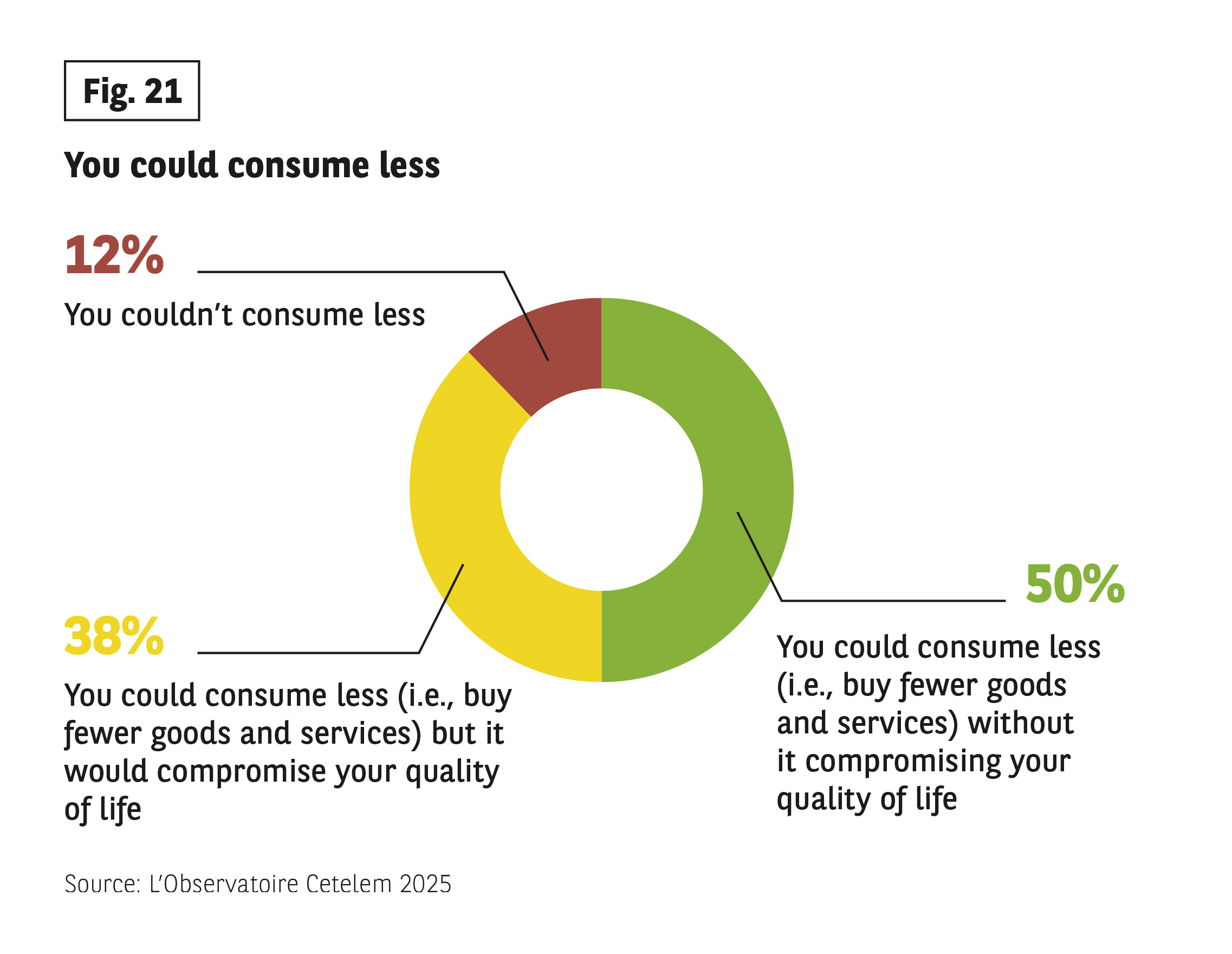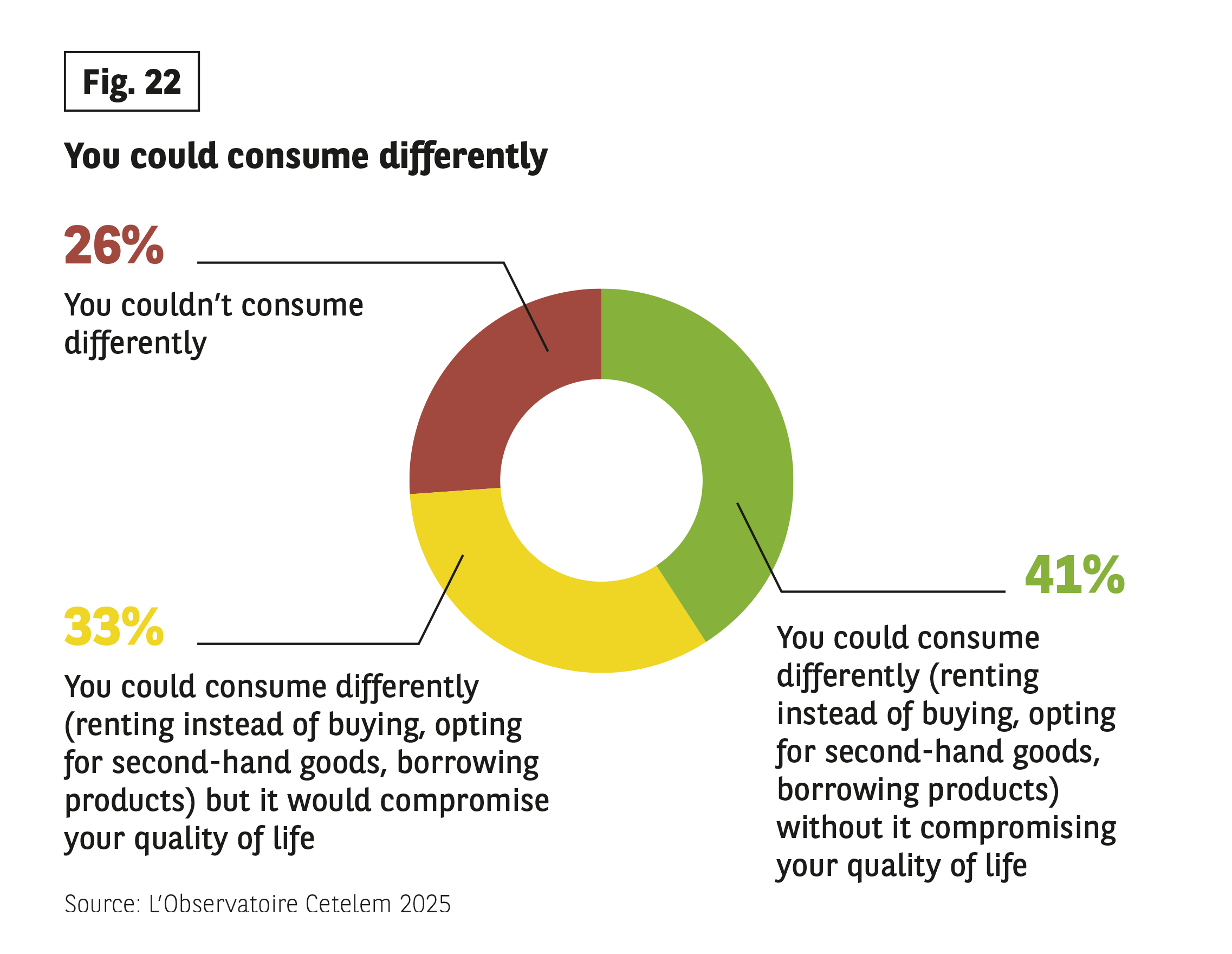A full reappraisal


Europeans reflect on their consumption and how it will evolve on a daily basis. This self-examination leads them to reappraise their current behaviours and to think about consuming less or differently. However, in their eyes there is still a long way to go for them to live more virtuously and embrace truly sustainable consumption. The consumption of tomorrow will no doubt place an even greater emphasis on services and non-material purchases. Indeed, these have already started to have a deep and lasting impact on the consumer landscape.
THE OPTION OF SPENDING LESS
Despite Europeans believing that consumption is on the up and that it is synonymous with enjoyment, frugality is also firmly on their agenda. The vast majority – almost 9 out of 10 – would consider consuming less, with half of those questioned remaining focused on preserving their quality of life nonetheless (Fig. 21).
Those on high incomes find it easier to envisage this possibility. It is undoubtedly less of a stretch for people to declare their desire to consume less when they have the means to do so and when they already have everything they need and even what could be considered superfluous.
Younger people also share this viewpoint, but for different reasons. Their attitude is shaped more by the idea that our species is consuming too much and jeopardising its own future.
Once again, Spain and Romania show the greatest enthusiasm for reducing consumption. Conversely, the desire to consume less is weakest in Portugal and France.
Fig 21 – Ability to reduce consumption
Download this infographic for your presentations Context
The figure shows the extent to which citizens feel they can consume fewer goods and services.
Visuals
Pie chart in three categories.
Data
• 50%: “You could consume less without it harming your quality of life”.
• 38%: “You could consume less but it would harm your quality of life”.
• 12%: “You couldn’t consume less”.
Synthetic reading
Half of the respondents say they can reduce their consumption without losing quality of life.
Spring
The Cetelem 2025 Observatory.
Context
The figure shows the extent to which citizens feel they can consume fewer goods and services.
Visuals
Pie chart in three categories.
Data
• 50%: “You could consume less without it harming your quality of life”.
• 38%: “You could consume less but it would harm your quality of life”.
• 12%: “You couldn’t consume less”.
Synthetic reading
Half of the respondents say they can reduce their consumption without losing quality of life.
Spring
The Cetelem 2025 Observatory.
THE IDEA OF A DIFFERENT FORM OF CONSUMPTION
While consuming less is central to the whole debate, consuming differently is just as important. Europeans appear quite receptive to the idea. Three-quarters of them agree with the premise, although a thin majority are keen for it not to negatively affect their quality of life (Fig. 22).
If we look at the results for each income category, age group and country, we can observe the same differences as those highlighted above. There is one exception, with the Belgians this time joining the Portuguese in being the most reluctant to consider consuming differently, rather than the French.
Fig 22 – Ability to consume differently
Download this infographic for your presentations Context
The figure explores the possibility of replacing traditional purchasing with alternative practices.
Visuals
Pie chart in three segments.
Data
• 41%: “You could consume differently without it harming your quality of life”.
• 33%: “You could consume differently but it would harm your quality of life”.
• 26%: “You couldn’t consume differently”.
Synthetic reading
A relative majority envisages alternative consumption practices.
Spring
The Cetelem 2025 Observatory.
Context
The figure explores the possibility of replacing traditional purchasing with alternative practices.
Visuals
Pie chart in three segments.
Data
• 41%: “You could consume differently without it harming your quality of life”.
• 33%: “You could consume differently but it would harm your quality of life”.
• 26%: “You couldn’t consume differently”.
Synthetic reading
A relative majority envisages alternative consumption practices.
Spring
The Cetelem 2025 Observatory.
